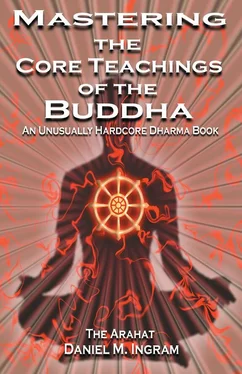Daniel Ingram - Mastering the Core Teachings of Buddha - An Unusually Hardcore Dharma Book
Здесь есть возможность читать онлайн «Daniel Ingram - Mastering the Core Teachings of Buddha - An Unusually Hardcore Dharma Book» весь текст электронной книги совершенно бесплатно (целиком полную версию без сокращений). В некоторых случаях можно слушать аудио, скачать через торрент в формате fb2 и присутствует краткое содержание. Год выпуска: 2009, ISBN: 2009, Издательство: Aeon Books, Жанр: Старинная литература, на русском языке. Описание произведения, (предисловие) а так же отзывы посетителей доступны на портале библиотеки ЛибКат.
- Название:Mastering the Core Teachings of Buddha - An Unusually Hardcore Dharma Book
- Автор:
- Издательство:Aeon Books
- Жанр:
- Год:2009
- ISBN:9781904658405
- Рейтинг книги:5 / 5. Голосов: 1
-
Избранное:Добавить в избранное
- Отзывы:
-
Ваша оценка:
- 100
- 1
- 2
- 3
- 4
- 5
Mastering the Core Teachings of Buddha - An Unusually Hardcore Dharma Book: краткое содержание, описание и аннотация
Предлагаем к чтению аннотацию, описание, краткое содержание или предисловие (зависит от того, что написал сам автор книги «Mastering the Core Teachings of Buddha - An Unusually Hardcore Dharma Book»). Если вы не нашли необходимую информацию о книге — напишите в комментариях, мы постараемся отыскать её.
Mastering the Core Teachings of Buddha - An Unusually Hardcore Dharma Book — читать онлайн бесплатно полную книгу (весь текст) целиком
Ниже представлен текст книги, разбитый по страницам. Система сохранения места последней прочитанной страницы, позволяет с удобством читать онлайн бесплатно книгу «Mastering the Core Teachings of Buddha - An Unusually Hardcore Dharma Book», без необходимости каждый раз заново искать на чём Вы остановились. Поставьте закладку, и сможете в любой момент перейти на страницу, на которой закончили чтение.
Интервал:
Закладка:
The take-home message is to take the desire to be happy and free of suffering and use its energy to do skillful things that can actually make this happen, rather than getting caught in old unexamined patterns of searching for happiness where you know you will not find it. The Three Trainings are skillful and can inform the whole of our life. By following them we may come to the end of many forms of suffering and be in a much better position to help others do the same.
TRUTH NUMBER THREE: THE END OF SUFFERING
This brings us nicely to the Third Noble Truth, the end of
suf ferin g. Now, as noted before, there are three types of suffering pertaining to the scope of each of the three trainings. Traditionally, the Buddha talked about the end of suffering as relating to mastering the third training and thus becoming highly enlightened. The first point is that it can be done and is done today by meditators like you from many spiritual traditions. Yes, there are enlightened people walking around, and not just a rare few that have spent 20 years in a cave in Tibet. This is really important to understand and have faith in. The other point is that with the end of fundamental desire, which we will render here as the end of compassion and reality being filtered through the odd logic of the process of ego, there is the end of fundamental suffering. That's it. Done is what has to be done. Gone, gone, gone beyond, and all of that. All beings can do it, and there is, to make bit of a mystical joke, no time like the present.
Now, it must be said that the Buddha also praised those who had mastered the other two trainings and thus eliminated what suffering could be eliminated by those methods. Even very enlightened beings can benefit from mastering the concentration states. However, there are some complex and difficult issues related to eliminating all of the ordinary suffering in the world and thus related to mastering the first training, which is an endless undertaking. It is because of this particular issue that such teachings as the Bodhisattva Vow arose, and I will deal with these complexities towards the end of this book.
65
The Four Noble Truths
TRUTH NUMBER FOUR: THE PATH
The Fourth Noble Truth is the Noble Eightfold Path
t hat
leads to suffering'
s final end . Another list! Hopefully you have
come to like these little lists by now, and so one more will hopefully be seen as another manageable little guide on how to find the end of suffering. Luckily, we have already seen the whole of the Noble Eightfold Path in other parts of some of the other lists, and it is summarized in the Three Trainings of morality, concentration and wisdom.
The morality section is just broken down into three specifics: skillful action, skillful speech and skillful livelihood. Skillful means conducive to the end of suffering for us and for all other living beings. Be kind, honest, clear and compassionate in your whole life, in your actions, speech and work. Notice that nothing is excluded here. The more of our lives we integrate with the spiritual path, the better. Simple to remember and also a powerful guide.
The concentration section contains three things we saw in the Five Spiritual Faculties and the Seven Factors of Enlightenment: skillful energy, skillful concentration, and skillful mindfulness.
The wisdom section has the two last parts of the path: skillful thought or intention and skillful understanding or wisdom. These two are often rendered in different ways, but the meaning is the same: understand the truth of your experience and aspire to kindness and wisdom in your thoughts and deeds. Again, simple but powerful.
66
9.PRACTICAL MEDITATION CONSIDERATIONS
WHEN, WHERE AND FOR HOW LONG?
The best time to meditate is when you can, as in “get it while you can!” The best place to meditate is where you can, and the best duration is for as long as is available or necessary for you to get what you wish out of it. This may seem like an obvious answer, but people can sometimes get it into their heads that certain times are better than others and thus not meditate when that seemingly sacred time period is unavailable or interrupted. They may feel that certain places or special circumstances (special cushions, noise levels, etc.) are oh-so-necessary, and if these are not available then they may feel frustrated and unable to practice. They may feel that a certain minimal duration of meditation time is necessary, and thus find themselves unable to make use of what time they may have.
If you have two hours each day for meditation, great! If you have two jobs, six kids, and just can’t find more than ten minutes each day for meditation, make good use of what you’ve got. There have been times in my life when I was very grateful that I had twenty hours a day to practice. On the other hand, when I have only had ten minutes a day, I have been grateful for the sense of how precious those ten minutes were. Skillful urgency and well-developed gratitude for a chance to practice at all can allow us to really use limited pieces of time to their fullest.
If you can take off a month each year for intensive retreats, wonderful. If a weekend retreat once a year is all you can do, go for it.
In short, honor where you are and what you can realistically accomplish given your current circumstances. If they are not entirely to your liking, and you want to take more time for practice, work on rearranging things a bit in a way that leaves you with a life that you still find fulfilling should you later decide to practice a bit less.
Luckily, meditation is an extremely portable endeavor. You don’t have to lug around special equipment, have other people around, or schedule an appointment. There are no fees, waiting lists, or red tape.
Reality happens. Sensations arise. If you’re payin’ careful attention to them, really feeling exactly what it is like to be here now, you’re doin’ it!
It’s just that simple.
Practical Meditation Considerations
While I have definitely come to appreciate “ideal” meditation conditions and their obvious benefits, I have also had profound insights and extraordinary experiences in places that would hardly be considered ideal (e.g. in the break room at work, while brushing my teeth). While I definitely appreciate the additional depth of long periods of uninterrupted practice, I am certain that being able to make use of little bits of time here and there has done much to move things along.
I sometimes meditate when reclining before sleep, when reclining in the morning before I have to get up, when I wake up in the middle of the night, before catnaps on the couch, during boring lectures and meetings, and in the lounge of the school I attended before afternoon classes. I have come to the conclusion that five minutes of really engaged, clear and focused practice in poor circumstances can often produce more benefits for me than an hour of poor, vague and distracted practice in “optimal conditions.”
I have also come to appreciate the value of timed sits, where I vow to sit and pay attention for a defined period of time. I take a little travel alarm clock or kitchen timer and vow to sit for a predetermined space of time, usually somewhere from 30 minutes to 1.5 hours. I have found that, during untimed sits, I tend to get up when I run into difficult territory, mild pain from sitting, or other things that I don’t want to acknowledge and investigate clearly. A timed sit makes it much more likely that I will be able to sit in the face of these things, thus developing more confidence and discipline, as well as the insights that come from persistent investigation.
DAILY LIFE AND RETREATS
A very related issue here is that of the world of retreats and monasticism and how it contrasts with the world of “daily life” or the life of a “householder.” Each has its own set of issues, but many of them overlap and the differences may be more question of degree than of dichotomy.
Читать дальшеИнтервал:
Закладка:
Похожие книги на «Mastering the Core Teachings of Buddha - An Unusually Hardcore Dharma Book»
Представляем Вашему вниманию похожие книги на «Mastering the Core Teachings of Buddha - An Unusually Hardcore Dharma Book» списком для выбора. Мы отобрали схожую по названию и смыслу литературу в надежде предоставить читателям больше вариантов отыскать новые, интересные, ещё непрочитанные произведения.
Обсуждение, отзывы о книге «Mastering the Core Teachings of Buddha - An Unusually Hardcore Dharma Book» и просто собственные мнения читателей. Оставьте ваши комментарии, напишите, что Вы думаете о произведении, его смысле или главных героях. Укажите что конкретно понравилось, а что нет, и почему Вы так считаете.












